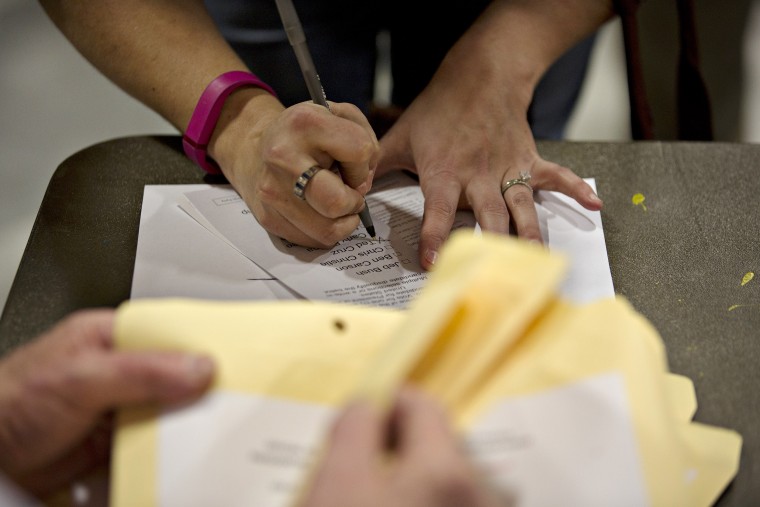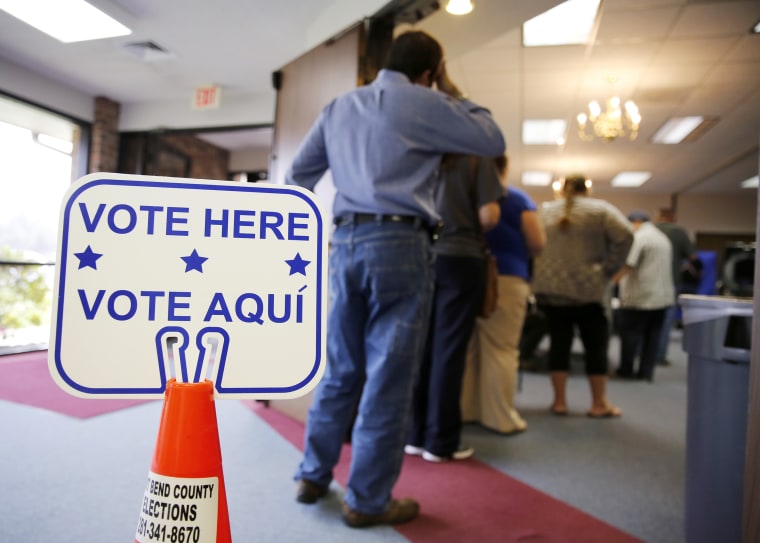SAN ANTONIO — The coronavirus pandemic could challenge Latino voter turnout this year, and voting advocates say it just adds to the barriers intentionally enacted to keep Latinos and voters of color from casting their ballots.
“Texas has a long history; it’s the state that has the most pronounced, overt, racist voter suppression tactics that we know of,” said Lydia Camarillo, president of the Southwest Voter Registration Education Project, formed in 1974 when Mexican Americans still were being kept from voting.
Latinos are almost 40 percent of the population and are on track to be the state's largest population group by next year. Latino turnout has been rising, but those trying to ramp up the bloc's voting in the state must each year overcome laws and measures that play a role in keeping them from voting.
Of more than 15,000 Covid-19 deaths in Texas so far, 56.1 percent are Hispanics and 30.1 percent are whites.
But Texas Republican Gov. Greg Abbott has refused to expand its mail-in voting to accommodate people concerned about being exposed to the virus when they go to the polls.
Abbott did expand early voting by six days, but others in his party are suing to prevent that expansion.
Abbott went further by announcing the shutdown of satellite locations for Texans allowed to vote by mail. He is allowing one drop-off box per county — a move, he said, that would protect the integrity of the elections and stop illegal voting.
The announcement drew immediate criticism and a lawsuit filed by the League of United Latin American Citizens.
The governor’s decision will have a big impact in Texas’ large urban counties, where Democrats have been winning, including in Harris County, the nation’s third most populous county.
Harris County Judge Lina Hidalgo slammed the governor’s decision, noting that the county for which she serves as the chief elected official is bigger than the state of Rhode Island. “This isn’t security, it’s suppression,” she said in a tweet.
If Texas wanted to facilitate broad participation, it would ensure remote and early voting were widely available, along with multiple, convenient and broadly available polling places, said Thomas Saenz, president and general counsel for Mexican American Legal Defense and Educational Fund.
“That is not what Texas is doing,” Saenz said. “That’s for a reason. Texas authorities know they are suppressing the vote.”
"The infrastructure of suppression"
Texas’ history of disenfranchising voters — from holding whites-only primaries, to barring people from voting based on whether they speak English, to outright intimidation and closing voting locations in minority locations — was so notorious that for years the state had to get Department of Justice approval for any election changes under Section 5 of the Voting Rights Act.
There’s no question that Latinos’ youth and the population’s disparities in education and income are factors in voter turnout. Younger people are less likely to show up at the polls. Voters who do, often are more educated and have higher incomes, Saenz said.
But Texas Latinos’ voter registration is lower than that of Hispanics in other parts of the country, so demography and disparities aren’t the only explanation. “Given Texas’ history, you have to believe some of that is obviously linked to race,” he said.
In 2013, the Supreme Court gutted the Voting Rights Act, and within hours, Texas imposed a strict Voter ID law. As an example, it allows only certain forms of ID — such as a gun permit — but not a college identification card, which is what many young voters have. An early version of the law was found to deliberately discriminate against Blacks and Latinos.
“For 144 years, Texas has perfected the science of suppressing voters at the ballot box,” Beto O’Rourke, a former presidential candidate and former congressman, said in a recent virtual Democratic event. Its preference for gun permits over college IDs is part of an “infrastructure of suppression,” he said.
Without the federal government oversight, the state became a national leader in reductions of polling sites, according to a study by The Leadership Conference Education Fund.
Last year, the state tried to purge its rolls of tens of thousands of voters based on flawed Texas drivers’ license data. The attempted purging followed a year in which Latinos had doubled their turnout at the polls. Although the state was stopped, the tactic may have terrorized some voters fearful of doing the wrong thing into skipping voting, Saenz said.
A voter registation obstacle course
After Monday, Oct. 5, it will be too late to register to vote in Texas.
The state has one of the earliest deadlines for registering — while it also spurns online registration. Federal law requires states to allow people to register to vote when they apply for a driver’s license. The state finally began to comply this week, after a federal judge ordered it. Texas now allows people who update or renew their licenses to also get on the voter rolls. Otherwise, people must fill in an application, print out the completed form and mail it in or drop it off.
Texas has also made it tough to register voters, requiring people to be deputized by taking training and passing an exam. The person registering must be able to vote in Texas and can only register voters in the county where they are deputized, for a limited time. There are 254 counties in Texas.
In 2017, the Republican-led Texas Legislature ended straight ticket voting — when a person votes for all candidates of a single party by checking or clicking on one box.
It came as more Democrats were straight ticket voting. Democrats won a reinstatement of straight ticket voting, but a three-judge panel of the 5th Circuit Court of Appeals overturned the decision this week after Republicans appealed.

Jason Villalba, a former Republican state representative who formed the Texas Hispanic Policy Foundation, said his Republican colleagues in the Legislature never intentionally diminished or limited the ability of Latinos to vote.
But there was a big concern among Republicans that Democrats would “game the system” and “harvest votes” among constituencies that do not historically vote, are economically disadvantaged and are people of color, said Villalba, now an independent voter. He acknowledged “exceptional ignorance to our community” exists.
Young Latinos boost voter numbers
The nonprofit Move Texas has been working since January to register voters, especially young people of color. It has mailed out 400,000 applications with stamped return envelopes.
The pandemic stalled the work that involved going to campuses and other places with clipboards and registering people — and underscored how difficult it is to register in Texas, said Drew Galloway, Move Texas executive director.
"Voter suppression is alive and well and we've known this since Move Texas started in 2013. We really had to help young people overcome these barriers set up by the state," Galloway said. He said 41 percent of the state is under age 30 and 63 percent of that group are young people of color, mostly Latino.
Despite the tougher registration rules, Latino voting has grown simply because of numbers. Albert Morales, senior political director for Latino Decisions polling firm, said 730,000 Latino Texans have turned 18 since Hillary Clinton ran in 2016.
Camarillo's Southwest Voter Registration Education Project had planned to visit high school classrooms to register at least 140,000 students who will be old enough to vote by Election Day.
Texas law requires schools to offer registration twice in a school year, but Camarillo said compliance is not enforced. The closure of schools by the pandemic hurt Camarillo's plans and now the group is relying on principals encouraging students to reach out to her group.
The state's secretary of state announced last month that 16,617,436 million Texans registered to vote, a record.
There are 5.6 million Latinos eligible to vote this year. But as of 2018, only 2.7 million were registered to vote and 1.9 million voted that November in the midterms.
Camarillo said she expects 2 to 2.1 million Latinos still will make it to the polls despite the obstacles.
Mary Moreno is the spokeswoman for the Texas Organizing Project, which is working to turn out 800,000 Latinos in November. The governor takes pride in Texas being first in everything, but not when it comes to voter participation, she said. “Everything he’s done has effectively suppressed the vote," she said. Abbott's latest limits on ballot drop-off locations "is the latest example.”
Follow NBC Latino on Facebook, Twitter and Instagram.



